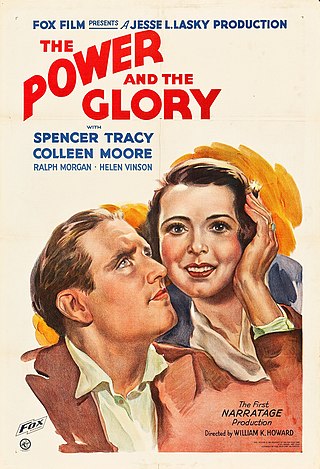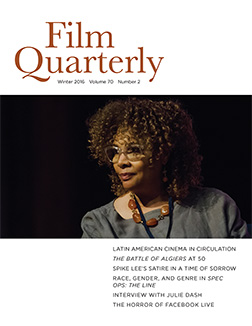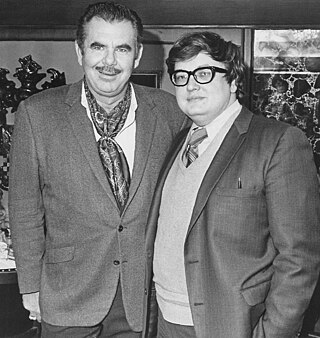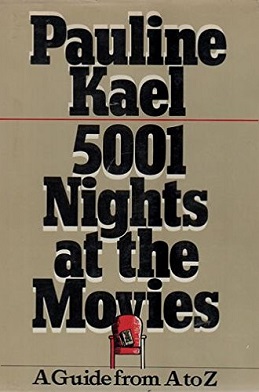Andrew Sarris was an American film critic. He was a leading proponent of the auteur theory of film criticism.

Pauline Kael was an American film critic who wrote for The New Yorker from 1968 to 1991. Known for her "witty, biting, highly opinionated and sharply focused" reviews, Kael's opinions often ran contrary to those of her contemporaries.

Siegfried Kracauer was a German writer, journalist, sociologist, cultural critic, and film theorist. He has sometimes been associated with the Frankfurt School of critical theory. He is notable for arguing that realism is the most important function of cinema.

The Power and the Glory is a 1933 pre-Code film starring Spencer Tracy and Colleen Moore, written by Preston Sturges, and directed by William K. Howard. The picture's screenplay was Sturges' first script, which he delivered complete in the form of a finished shooting script, for which he received $17,500 and a percentage of the profits. Profit-sharing arrangements, now a common practice in Hollywood, were then unusual and gained Sturges much attention.
Renata Adler is an American author, journalist, and film critic. Adler was a staff writer-reporter for The New Yorker for over thirty years and the chief film critic for The New York Times from 1968 to 1969. She has also published several fiction and non-fiction books, and has been awarded the O. Henry Prize, a Guggenheim Fellowship, and the PEN/Hemingway Award.

Richard Nelson Corliss was an American film critic and magazine editor for Time. He focused on movies, with occasional articles on other subjects.

From Caligari to Hitler: A Psychological History of the German Film is a book by film critic and writer Siegfried Kracauer, published in 1947.
Dwight Macdonald was an American writer, critic, philosopher, and activist. Macdonald was a member of the New York Intellectuals and editor of their leftist magazine Partisan Review for six years. He also contributed to other New York publications including Time, The New Yorker, The New York Review of Books, and Politics, a journal which he founded in 1944.

Film Quarterly, a journal devoted to the study of film, television, and visual media, is published by University of California Press. It publishes scholarly analyses of international and Hollywood cinema as well as independent film, including documentary and animation. The journal also revisits film classics; examines television and digital and online media; reports from international film festivals; reviews recent academic publications; and on occasion addresses installations, video games and emergent technologies. It welcomes established scholars as well as emergent voices that bring new perspectives to bear on visual representation as rooted in issues of diversity, race, lived experience, gender, sexuality, and transnational histories. Film Quarterly brings timely critical and intersectional approaches to criticism and analyses of visual culture.
Otis Ferguson was an American writer best remembered for his music and film reviews in The New Republic in the 1930s.

Kiss Kiss Bang Bang (1968) is Pauline Kael's second collection of reviews from 1965 through 1968, compiled from numerous magazines including The Atlantic, Holiday, The New Yorker, Life, Mademoiselle, The New Republic, McCall's, and Vogue. It features her review of The Sound of Music, which she notoriously dubbed "The Sound of Money," sparking outrage from loyal readers of McCall's. This is erroneously considered to be the reason why she was fired from her short-lived position as their film critic. The book also features a smaller collection of synopses of little-known movies, some of which are also printed in Kael's 5001 Nights at the Movies.

Reeling is Pauline Kael's fifth collection of movie reviews, covering the years 1972 through 1975. First published in 1976 by Little Brown, the book is largely composed of movie reviews, ranging from her famous review of Last Tango in Paris to her review of A Woman Under the Influence, but it also contains a longer essay entitled "On the Future of Movies" as well as a book review of The Fred Astaire & Ginger Rogers Book, by fellow The New Yorker dance critic Arlene Croce. In 2010, four film critics polled by the British Film Institute listed Reeling among their favorite books related to cinema.

Going Steady: Film Writings 1968–1969 is the third collection of film reviews by the critic Pauline Kael, comprising the years 1968–1969, when she first began her film-reviewing duties at The New Yorker and which covers, " a crucial period of social and aesthetic change at the end of the sixties."

Film criticism is the analysis and evaluation of films and the film medium. In general, film criticism can be divided into two categories: Academic criticism by film scholars, who study the composition of film theory and publish their findings and essays in books and journals, and general journalistic criticism that appears regularly in press newspapers, magazines and other popular mass-media outlets. Academic film criticism rarely takes the form of a review; instead it is more likely to analyse the film and its place in the history of its genre, the industry and film history as a whole.
An auteur is an artist with a distinctive approach, usually a film director whose filmmaking control is so unbounded and personal that the director is likened to the "author" of the film, thus manifesting the director's unique style or thematic focus. As an unnamed value, auteurism originated in French film criticism of the late 1940s, and derives from the critical approach of André Bazin and Alexandre Astruc, whereas American critic Andrew Sarris in 1962 called it auteur theory. Yet the concept first appeared in French in 1955 when director François Truffaut termed it policy of the authors, and interpreted the films of some directors, like Alfred Hitchcock, as a body revealing recurring themes and preoccupations.

5001 Nights at the Movies: A Guide from A to Z, first published in 1982, is a book compiling passages of film critic Pauline Kael's reviews from the silent era to the early 1980s. They were originally written for The New Yorker’s 'Goings On About Town' section.

For the Love of Movies: The Story of American Film Criticism is a 2009 documentary film dramatizing a hundred years of American film criticism through film clips, historic photographs, and on-camera interviews with many of today’s important reviewers, mostly print but also Internet. It was produced by Amy Geller, written and directed by long-time Boston Phoenix film critic Gerald Peary, and narrated by Patricia Clarkson. Critics featured include Roger Ebert of The Chicago Sun-Times, A.O. Scott of The New York Times, Lisa Schwarzbaum of Entertainment Weekly, Kenneth Turan of The Los Angeles Times, and Elvis Mitchell, host of the public radio show The Treatment.

"Raising Kane" is a 1971 book-length essay by American film critic Pauline Kael, in which she revived controversy over the authorship of the screenplay for the 1941 film Citizen Kane. Kael celebrated screenwriter Herman J. Mankiewicz, first-credited co-author of the screenplay, and questioned the contributions of Orson Welles, who co-wrote, produced and directed the film, and performed the lead role. The 50,000-word essay was written for The Citizen Kane Book (1971), as an extended introduction to the shooting script by Mankiewicz and Welles. It first appeared in February 1971 in two consecutive issues of The New Yorker magazine. In the ensuing controversy, Welles was defended by colleagues, critics, biographers and scholars, but his reputation was damaged by its charges. The essay and Kael's assertions were later questioned after Welles's contributions to the screenplay were documented.

The authorship of the screenplay for Citizen Kane, the 1941 American motion picture that marked the feature film debut of Orson Welles, has been one of the film's long-standing controversies. With a story spanning 60 years, the quasi-biographical film examines the life and legacy of Charles Foster Kane, played by Welles, a fictional character based in part upon the American newspaper magnate William Randolph Hearst and Chicago tycoons Samuel Insull and Harold McCormick. A rich incorporation of the experiences and knowledge of its authors, the film earned an Academy Award for Best Original Screenplay for Herman J. Mankiewicz and Welles.

The First Collection of Criticism by a Living Female Rock Critic is a 2015 essay collection by music critic Jessica Hopper.















